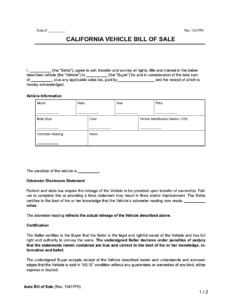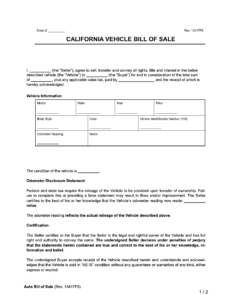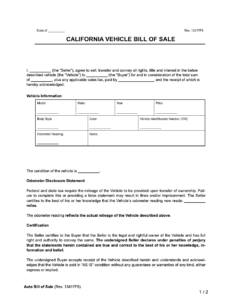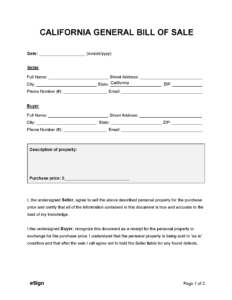Buying or selling a car in California can be an exciting time, but it also comes with important paperwork that ensures a smooth and legally sound transfer of ownership. One of the most crucial documents you’ll encounter is the bill of sale. It’s not just a simple receipt; it’s a vital record that protects both the buyer and the seller, providing clear evidence of the transaction and details of the vehicle involved.
Navigating the necessary steps can feel a bit overwhelming, especially if it’s your first time or you’re unsure about specific California requirements. That’s where having a reliable bill of sale comes into play. It simplifies the process by clearly outlining all the essential information, making sure nothing important is overlooked and helping you avoid potential headaches down the road.
Why a Bill of Sale is Absolutely Essential in California
Think of a bill of sale as your official “receipt” and “agreement” all rolled into one when dealing with vehicle transactions in California. While the California Department of Motor Vehicles (DMV) doesn’t always strictly require a bill of sale for every single transaction (like when you’re just transferring a title), it is profoundly important for your protection. It serves as concrete proof of the transfer of ownership, which is crucial for legal liability and proper record-keeping. Without it, determining exactly when the car changed hands, and thus who is responsible for it, can become a messy legal quagmire.
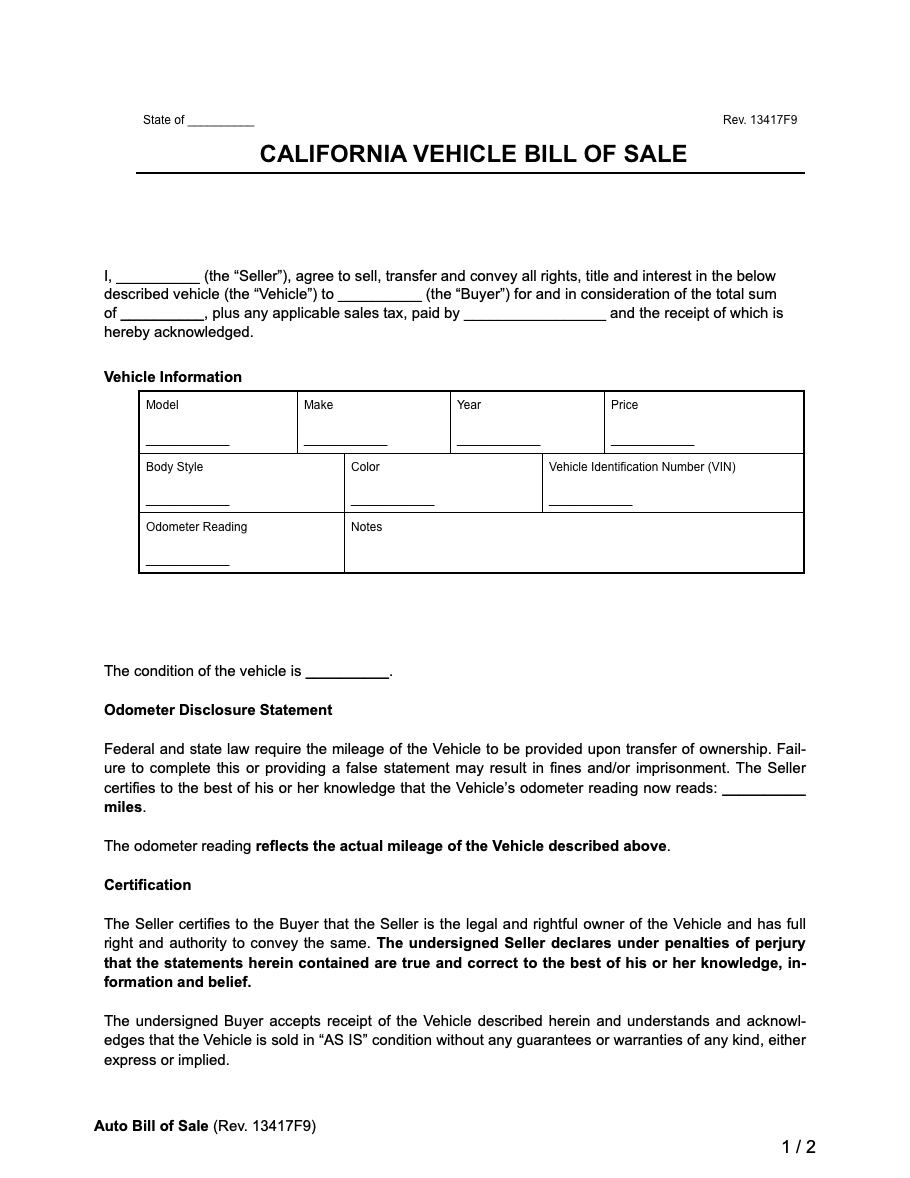
For the buyer, a well-prepared bill of sale acts as a foundational document for vehicle registration. It officially proves you purchased the vehicle and specifies the agreed-upon price. This helps prevent future disputes about the sale amount and confirms the transaction’s legitimacy. It also provides a clear record of the vehicle’s condition at the time of sale, especially if an “as-is” clause is included, outlining that the buyer accepts the car in its current state without warranties from the seller.
From the seller’s perspective, the bill of sale is your shield. Once the vehicle is sold, you want to ensure that any liability for the car, whether it’s parking tickets, accidents, or other legal issues, transfers completely to the new owner from the moment of sale. A dated and signed bill of sale is your undeniable proof that the vehicle was no longer under your ownership or responsibility as of that specific date. It protects you from potential legal claims or financial burdens that could arise after the vehicle leaves your possession.
Moreover, the bill of sale provides a comprehensive record of the vehicle and the terms of the sale. This level of detail is invaluable should any questions arise from either party, or from legal or governmental entities like the DMV or law enforcement. It’s like having an unshakeable witness to your transaction, detailing every significant aspect of the transfer.
Key Information to Include in Your California Bill of Sale
- Full legal names and addresses of both the buyer and the seller.
- The specific date of the sale.
- Detailed description of the vehicle: year, make, model, color, and most importantly, the Vehicle Identification Number (VIN).
- Current odometer reading at the time of sale.
- The agreed-upon sale price of the vehicle.
- Any specific terms of the sale, such as “as-is” condition, or if there’s a lien involved.
- Signatures of both the buyer and the seller.
- If applicable, notary acknowledgment (though not always required, it adds an extra layer of authenticity).
Finding and Using a Reliable Bill of Sale Template
In today’s digital age, creating legal documents from scratch can be daunting and prone to errors. This is where the convenience of a pre-designed bill of sale template for car California transactions truly shines. Instead of worrying about what information to include or how to format it, a template provides a clear, structured framework that ensures you don’t miss any critical details. It takes the guesswork out of the process, allowing you to focus on the transaction itself rather than the intricacies of document drafting.
You’ll find various resources online offering a bill of sale template for car California. Many legal document websites, automotive resources, and even some state DMV-related sites might offer downloadable versions. When selecting a template, it’s important to choose one that is clearly designed for vehicle sales and, ideally, takes into account general California requirements, even if it’s not an official state form. Look for templates that are comprehensive, easy to understand, and editable so you can fill in your specific details accurately.
A good template will guide you through all the necessary fields, prompting you for information like the buyer’s and seller’s contact details, the vehicle’s make, model, year, VIN, and the crucial odometer reading. It will also have dedicated spaces for the sale price, the date of the transaction, and most importantly, signature lines for both parties. Some templates might also include a section for an “as-is” clause or details about any liens on the vehicle, which are incredibly important for clarity and protection.
Once you have your bill of sale template for car California, filling it out carefully is paramount. Double-check every piece of information for accuracy, especially the VIN and odometer reading, as these are critical identifying details. It’s always best practice to use black ink, ensure legibility, and make copies for both the buyer and the seller to keep for their records. Having a signed copy provides peace of mind and protection for both parties, making the entire car-selling or buying experience much smoother and more secure.
The process of buying or selling a car, while exciting, necessitates attention to detail, especially regarding legal documentation. By utilizing a properly filled-out bill of sale, both the buyer and the seller can proceed with confidence, knowing that their interests are protected and the transaction is clearly documented. This simple yet powerful document serves as your definitive proof of ownership transfer, laying a solid foundation for all future vehicle-related interactions.
Taking the time to ensure you have a complete and accurate bill of sale in your California car transaction offers immense peace of mind. It streamlines the process for everyone involved, prevents potential misunderstandings, and ensures that you are fully compliant with the essential steps of transferring vehicle ownership in the Golden State. Make it a non-negotiable part of your next car deal.
